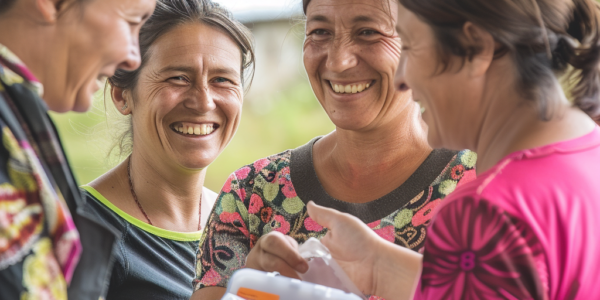Survey Reveals Gap Between Awareness and Action in Women’s Preventive Health Screenings
A recent Gallup survey reveals that while 90% of women acknowledge the importance of preventive health screenings, over 40% delay or skip them due to anxiety, cost, and time constraints. This highlights a significant gap between awareness and action in women’s health. Addressing barriers through education and affordable access to screenings is crucial for improving health outcomes.
DIY kits could increase cervical-cancer tests by a million
Researchers estimate that over one million extra women could have life-saving cervical-cancer checks if the NHS adopted DIY testing kits. The self-testing trial results were described as fantastic, giving power to women. The kits, similar to Covid swabs, are sent to a lab for analysis. This innovative approach could help increase cervical cancer screening rates and reach women across different demographics.
Nova Scotia to Introduce At-Home HPV Testing Kits
Nova Scotia is set to introduce at-home HPV testing kits to improve accessibility to testing for individuals without primary care physicians. Doctor Robert Grimshaw of the Nova Scotia Health Cervical Cancer Screening Program has announced the anticipated rollout within the next two years. This initiative aims to streamline the testing process and encourage more individuals to undergo HPV screening, empowering residents to take proactive steps towards safeguarding their health.
Nigeria Introduces HPV Vaccine for Children in National Immunization Program
The Federal Government of Nigeria has introduced the Human Papillomavirus (HPV) Vaccine into the national immunization program targeting children aged nine to fourteen years old. Stakeholders are urged to raise awareness about the importance of the vaccine in preventing cervical cancer, a silent killer with long-term effects. The government is working to make the vaccine accessible to the targeted demographic to enhance disease prevention and public health among children in Nigeria.
Study Shows HPV Vaccine Benefits Men and Boys in Preventing Various Cancers
Discover the significant benefits of the HPV vaccine for men and boys in reducing the risk of head and neck cancers and other malignancies. A recent study examined over 3.4 million individuals, showcasing the long-term effectiveness of the vaccine in preventing HPV-related cancers. Learn how vaccination can mitigate the risk of various cancers affecting different parts of the body and the impact of HPV infections on head and neck cancers.
Kentucky Leads Effort to Increase HPV Vaccination Rates
Learn how Kentucky is leading the U.S. in efforts to increase HPV vaccination rates and prevent cervical cancer. With the HPV vaccine proven to be highly effective in preventing various cancers, including cervical cancer, researchers are working to raise awareness and improve vaccination rates among children to eliminate HPV-related cancers in the future.
Yale Researchers Uncover Genetic Landscape of Neuroendocrine Tumors of the Cervix
Researchers from Yale School of Medicine have made significant strides in understanding the genetic landscape of neuroendocrine tumors of the cervix (NETc) to potentially improve treatments for this rare and aggressive disease. The study, published in the Proceedings of the National Academy of Sciences, unveiled novel genes and pathways that could pave the way for precision medicine approaches in treating NETc patients. Dr. Alessandro Santin emphasized the importance of genetic data in guiding the development of innovative therapies, suggesting a combination of common chemotherapy regimens with immunotherapies for a more effective treatment strategy.
Irregular Periods and Cervical Cancer: What Women Need to Know
Irregular periods can sometimes be the only warning sign of cervical cancer. Women must pay attention to their bodies and take note of any changes in their menstrual cycles, as irregular periods can be indicative of an underlying health issue like cervical cancer. Dr. Jyoti Mehta, MD Radiation and Clinical Oncologist at TGH Onco Life Cancer Centre, emphasizes the importance of actively monitoring and addressing changes in menstrual patterns to maintain reproductive health and prevent cervical cancer. Symptoms to watch out for include unusual discharge, abnormal vaginal bleeding, pelvic pain, discomfort during intercourse, and irregular periods. It is crucial for women to be aware of these symptoms and seek medical attention if they experience any signs of cervical cancer.
Keytruda Shows Promising Results in Cervical Cancer Trial
Merck’s Keytruda has shown promising results in a recent cervical cancer trial, raising hopes for a broader FDA approval in the near future. The trial, known as KEYNOTE-A18, demonstrated that Keytruda, in combination with chemoradiotherapy (CRT), significantly improved overall survival (OS) in patients with earlier-stage cervical cancer. Keytruda’s previous FDA approval, granted in October 2021, allowed its use in combination with chemotherapy for the treatment of persistent, recurrent, or metastatic cervical cancer. However, this approval was subject to certain restrictions, including the requirement for tumors to express the PD-L1 biomarker at a combined positive score (CPS) of at least 1. The recent success of Keytruda in the KEYNOTE-A18 trial has reignited hopes for a broader FDA approval, potentially expanding the reach of this groundbreaking immunotherapy to benefit a larger population of cervical cancer patients.
Transforming Health Care: Fighting Cervical Cancer in Marginalized Communities
Home-test kits and mobile labs for detecting cervical cancer are transforming health care in remote or marginalized communities. Magdalena Rothova, director of the Association for Culture, Education and Communication (ACEC) in Slovakia, is leading the charge to reduce deaths from cervical cancer in Europe. By empowering marginalized communities with the tools for early detection and intervention, initiatives like the PRESCRIP-TEC project are paving the way for improved cervical cancer outcomes in regions where access to traditional screening methods may be limited.










